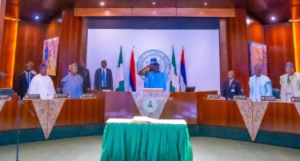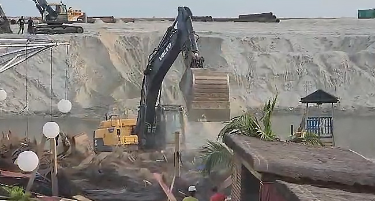The Federal Government has announced a suspension of approvals for the construction of new road networks across Nigeria. This significant development was disclosed by the Minister of Works, David Umahi, on Sunday during a stakeholders engagement session held in Calabar. The meeting, organized by the Federal Ministry of Works, focused on the proposed alignment for sections 3A and the design of approximately 97 kilometers of the Spur of the Lagos-Calabar Coastal Highway project, specifically addressing the segment connecting Cross River State to the South-East and North-Central regions of Nigeria.
Minister Umahi explained that this decision follows a directive from President Bola Tinubu. The directive emphasizes the prioritization of completing ongoing road projects in the 2025 budget, rather than embarking on new ones. This strategic shift aims to ensure that current infrastructure projects reach completion, thereby maximizing the benefits for the country’s transportation network.
Detailing the specifics of the Lagos-Calabar Coastal Highway, Umahi highlighted that section 3A of the project spans approximately 38 kilometers, connecting from the Akwa Ibom axis through Cross River State. Additionally, there will be a 92-kilometer spur of the same coastal highway within Cross River State, bringing the total length of new construction in the state to 130 kilometers.
 The minister elaborated that this 92-kilometer spur will traverse several states, including Enugu, Ebonyi, Benue, Kogi, Nasarawa, and the Federal Capital Territory, Abuja, eventually linking to Lagos. He also expressed concern over the poor handling of the existing Odukpani-Itu federal road contract. Umahi issued a stern warning to the contractors, stating that they must return to the site promptly or risk having their contracts revoked.
The minister elaborated that this 92-kilometer spur will traverse several states, including Enugu, Ebonyi, Benue, Kogi, Nasarawa, and the Federal Capital Territory, Abuja, eventually linking to Lagos. He also expressed concern over the poor handling of the existing Odukpani-Itu federal road contract. Umahi issued a stern warning to the contractors, stating that they must return to the site promptly or risk having their contracts revoked.
Discussing the broader impact of the Lagos-Calabar Coastal Highway project, Umahi described it as a pivotal initiative championed by President Tinubu. He emphasized that the highway aims to enhance connectivity and stimulate economic growth along Nigeria’s coastal regions. “Once completed, the highway is expected to facilitate smoother transportation of goods and people, boost trade activities, and spur regional development,” Umahi stated.
As a former governor of Ebonyi State, Umahi underscored that this project is poised to be one of President Tinubu’s enduring legacies, benefiting future administrations and generations. The importance of this project is echoed by Cross River State Governor Bassey Otu, who pledged his administration’s full support for the successful execution of the coastal highway project. Represented by the state’s Deputy Governor Peter Odey, Governor Otu highlighted the substantial economic benefits the project promises for Cross River State and the broader southern and north-central regions of Nigeria.
Governor Otu stressed the vital role that a robust road network plays in the economic development of the state, region, and nation. He instructed the state commissioner for works to actively engage with the Federal Ministry of Works’ team, ensuring that no obstacles impede the smooth execution of the project, which is slated to commence in the Calabar axis in August.
Deputy Governor Odey also assured Minister Umahi that the Cross River State government has obtained the necessary state executive council approval to compensate those affected by the right of way for the Odukpani–Itu federal highway project. This move aims to facilitate seamless progress for the contractors involved.
In conclusion, the suspension of new road network approvals by the Federal Government marks a strategic pivot towards the completion of ongoing projects. The Lagos-Calabar Coastal Highway, in particular, stands out as a transformative initiative poised to significantly enhance Nigeria’s infrastructure landscape. With robust support from state governments and a clear focus on existing projects, the administration is set on a path to delivering tangible and lasting infrastructure improvements.




